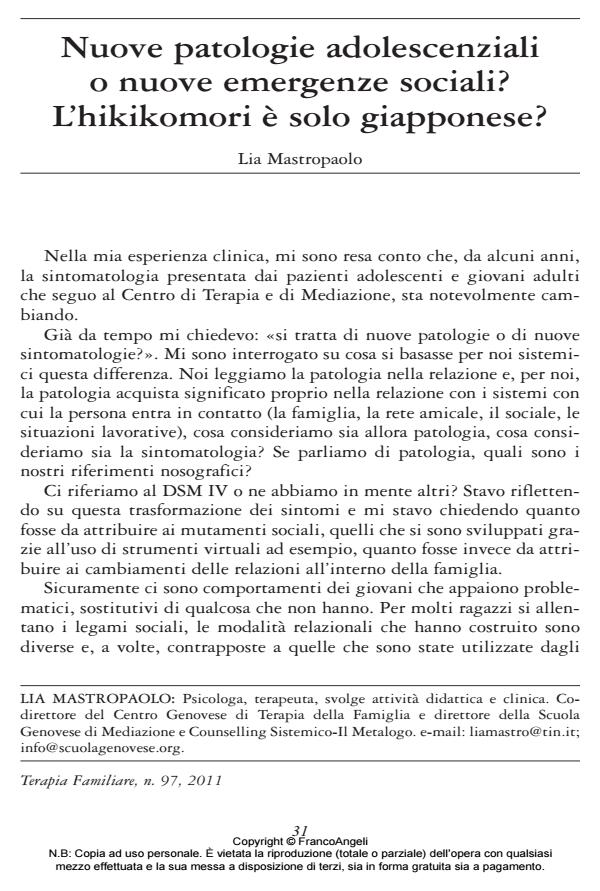Nuove patologie adolescenziali o nuove emergenze sociali? L’hikikomori è solo giapponese?
Journal title TERAPIA FAMILIARE
Author/s Lia Mastropaolo
Publishing Year 2012 Issue 2011/97 Language Italian
Pages 27 P. 31-57 File size 265 KB
DOI 10.3280/TF2011-097002
DOI is like a bar code for intellectual property: to have more infomation
click here
Below, you can see the article first page
If you want to buy this article in PDF format, you can do it, following the instructions to buy download credits

FrancoAngeli is member of Publishers International Linking Association, Inc (PILA), a not-for-profit association which run the CrossRef service enabling links to and from online scholarly content.
More and more frequently, over the last years of her clinical activity, the author has met young adults showing the same symptomatology, that is to say staying locked at home, in a room/den, spending all day surfing the net, creating a virtual alter ego and living parallel lives. The question is whether we are encountering new pathologies or symptomatologies. In order to give an answer to this question, the author discusses the necessary changes she made to her methods when treating pathologies, the way in which she has been "reading" the symptoms, using hypothesis, treating the engagement of the teenager, the young adult and his family, as well as the way in which she has been keeping the therapeutic relationship if compared with the past and the way in which she has been taking into account of the symptoms within the therapeutic path. The author compares the past researches conducted on adolescents with today researches, as well as the Japanese phenomenon known as hikikomori with new evidences in Italian young people and, through three clinical cases, she shows the following new methods of approach: "floating therapies" and the work on self.
Keywords: Hikikomori, systemic therapies, "floating therapies", work on self, new social emergency, young adult
- Un lunghissimo virus. Effetti a distanza della Pandemia da Covid-19 Antonello D’Elia, in TERAPIA FAMILIARE 129/2022 pp.11
DOI: 10.3280/TF2022-129002 - Hikikomori: debating a XXI century phenomenon from a clinical point of view Fiorenzo Ranieri, Luciano Luccherino, in Scandinavian Journal of Child and Adolescent Psychiatry and Psychology /2018 pp.72
DOI: 10.21307/sjcapp-2018-002 - Hikikomori e anoressia: famiglie e identità fragili a confronto Chiara Molinu, in RIVISTA DI PSICOTERAPIA RELAZIONALE 48/2019 pp.75
DOI: 10.3280/PR2018-048003 - Voglio stare solo, ma connesso Hikikomori, famiglie e dinamiche relazionali Daniela Tortorelli, in PSICOBIETTIVO 2/2022 pp.48
DOI: 10.3280/PSOB2022-002005 - Handbook of Systemic Approaches to Psychotherapy Manuals Lia Mastropaolo, pp.373 (ISBN:978-3-030-73639-2)
Lia Mastropaolo, Nuove patologie adolescenziali o nuove emergenze sociali? L’hikikomori è solo giapponese? in "TERAPIA FAMILIARE" 97/2011, pp 31-57, DOI: 10.3280/TF2011-097002